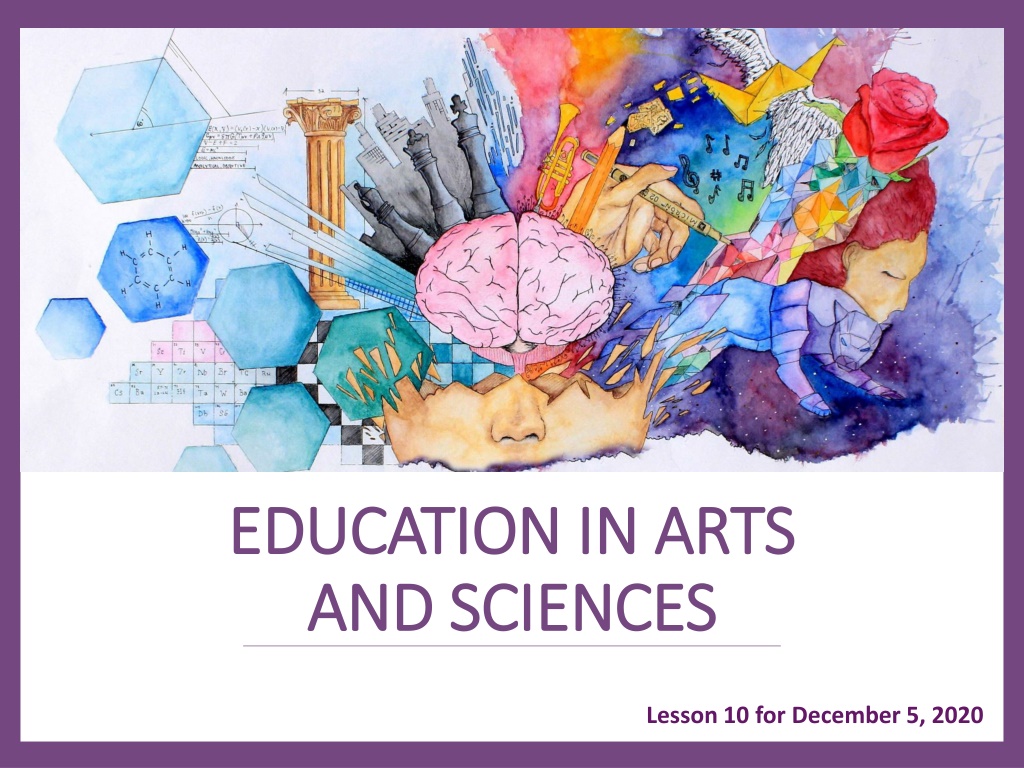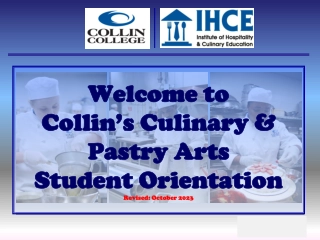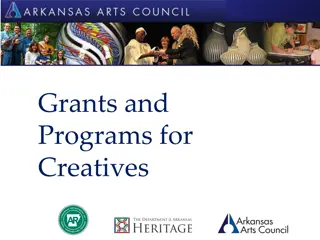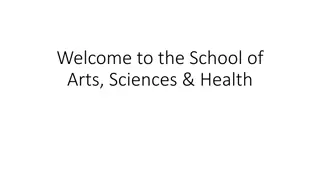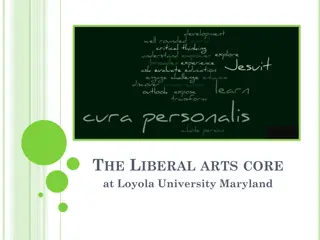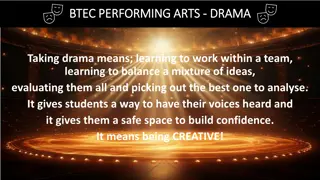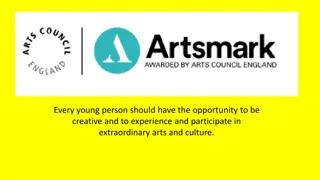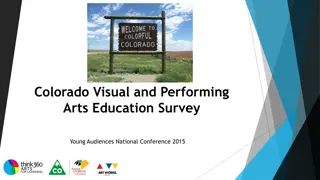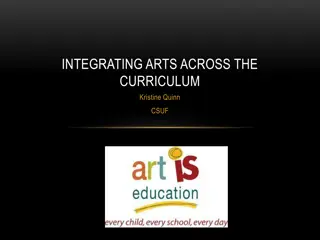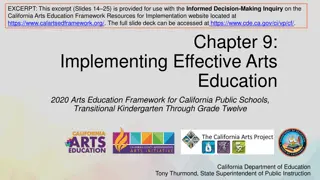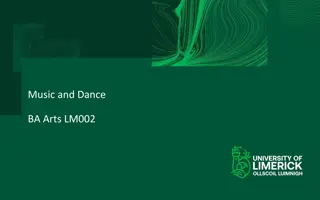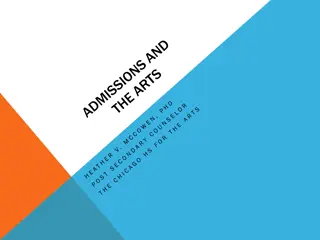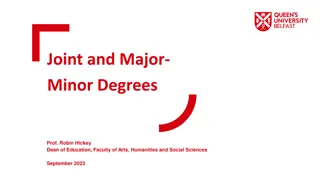Exploring Education in Arts and Sciences from a Christian Perspective
This lesson delves into the Christian worldview on teaching arts and sciences, emphasizing the importance of education for the human race's survival. It discusses the broad scope of true education, the harmonious development of physical, mental, and spiritual powers, and the need to include God in educational concepts. The content underscores the relationship between faith and science, seeking excellence in education, and avoiding common mistakes in education practices.
Download Presentation

Please find below an Image/Link to download the presentation.
The content on the website is provided AS IS for your information and personal use only. It may not be sold, licensed, or shared on other websites without obtaining consent from the author. Download presentation by click this link. If you encounter any issues during the download, it is possible that the publisher has removed the file from their server.
E N D
Presentation Transcript
EDUCATION IN ARTS EDUCATION IN ARTS AND SCIENCES AND SCIENCES Lesson 10 for December 5, 2020
EDUCATION IN ARTS EDUCATION IN ARTS AND SCIENCES AND SCIENCES This week we will look at some principles involved in how we can teach the arts and sciences from the Christian perspective and worldview. Lesson Book Introduction There is a lot of confusion about terms in this lesson. The Arts include many subjects such as literature as well as the visual arts. The sciences also include many different aspects.
A questions from Daniel Duda speaking to the Pine Knoll group. Why is education crucial for the survival of the human race? It is easy to miss how our world has changed in the last 300 years. If a peasant who died in the year 1000 could wake up in the 16th century in the time of the Reformation, he would easily interact with that world. But if someone who died in the 17th century could wake up today, such a person would feel completely out of place, struggle to relate, overwhelmed by a world which they do not understand.
Our ideas of education take too narrow and too low a range. There is need of a broader scope, a higher aim. True education means more than the pursual of a certain course of study. It means more than a preparation for the life that now is. It has to do with the whole being, and with the whole period of existence possible to man. It is the harmonious development of the physical, the mental, and the spiritual powers. It prepares the student for the joy of service in this world and for the higher joy of wider service in the world to come. E G White Education pg 13
Present-day education assumes that God does not exist or does not take part in the natural processes. This assumption rejects any supernatural phenomenon, the idea of a past without death, or that the Universe was created suddenly by an almighty God. As Christians, our education must include those concepts. They will help us to make the most of our education in arts and sciences. The foundation of education: God and education in sciences God and education in arts Education in arts and sciences: Avoiding common mistakes Seeking excellence Conflicts between faith and science
The heavens declare the glory of God; and the firmament shows His handiwork (Psalm 19:1) Memory Verse
GOD AND EDUCATION IN SCIENCES When we study how God designed life in genetics and the conception process, we see the wonders of His kind love. For example, He decided that the fetus would grow close to their mother's heart, and that the mother would be able to see how the baby grows within her (it's impossible for her to ignore them). The more we learn about the laws of nature God established, the more reasons we have to praise Him for His wisdom. As Paul said, we are without excuse to deny the existence of God after having studied nature (Romans 1:20).
GOD AND EDUCATION IN SCIENCES For since the creation of the world His invisible attributes are clearly seen, being understood by the things that are made, even His eternal power and Godhead, so that they are without excuse, because, although they knew God, they did not glorify Him as God, nor were thankful, but became futile in their thoughts, and their foolish hearts were darkened. (Romans 1:20-21) You alone are the Lord; You have made heaven, The heaven of heavens, with all their host, The earth and everything on it, The seas and all that is in them, And You preserve them all. The host of heaven worships You. (Nehemiah 9:6) Interestingly enough, the natural scientists are statistically more inclined to believe than are their academic colleagues in either the humanities or the behavioral and social sciences, even though we often perceive the greatest threat to our world view as coming from the natural sciences. One survey reported that 20% of natural scientists do not believe in God, compared with 36% of humanities scholars, and 41% of the social scientists. from The Struggle for America's Soul: Evangelicals, Liberals, and Secularism (1989)
GOD AND EDUCATION IN SCIENCES Sin entered the world thousands of years ago, and it resulted in two series of changes . Cursed is the ground for your sake; In toil you shall eat of it All the days of your life. Both thorns and thistles it shall bring forth for you. (Genesis 3:17b-18a) And God said to Noah, The end of all flesh has come before Me, for the earth is filled with violence through them; and behold, I will destroy them with the earth. (Genesis 6:13) We are unable today to see the world as it was created. The changes are misinterpreted (the dramatic changes of the flood are thought to have taken place over a long time).
Friday lesson book Two reasons exist why science, which gets so many things right, gets origins so wrong: first, science, which studies the natural world, must look only to the natural world for answers; second, science assumes that the laws of nature must remain constant. Yet, both these are wrong when it comes to origins. Take the first one, which requires natural causes for natural events. That s fine for hurricane tracking, but it is worse than worthless for origins that start out with In the beginning God created the heavens and the earth (Gen. 1:1, NKJV). What can science, which denies the supernatural in origins, teach us about origins that were totally supernatural? And the constancy of nature? A world in which death did not exist is radically different from anything we can study today, and to assume they were very similar when they weren t also will lead to error. Hence, science gets origins wrong because it denies two crucial aspects of the Creation: the supernatural force behind it, and the radical physical discontinuity between the original creation and what s before us now.
GOD AND EDUCATION IN ARTS He has made everything beautiful in its time. (Ecclesiastes 3:11) We can still beauty in nature. Even in the microscopic world, like in the symmetry of a snowflake. God is the source of beauty. He loves physical and spiritual beauty. He values the beauty of a converted character, and He wants to be worshipped in the beauty of holiness. (Psalms 96:9) Let us look at three examples of God s beauty in nature: - The sunset - A rainbow - A small flower
GOD AND EDUCATION IN ARTS He has made everything beautiful in its time. (Ecclesiastes 3:11) We can still beauty in nature. Even in the microscopic world, like in the symmetry of a snowflake. God is the source of beauty. He loves physical and spiritual beauty. He values the beauty of a converted character, and He wants to be worshipped in the beauty of holiness. (Psalms 96:9) Nevertheless, not everything beautiful is also good. Solomon warned us about sinful people: Do not lust after her beauty in your heart , because he/she will drag you to sin (Proverbs 6:25). Eve learnt this the hard way. Not all that is pleasant to the eyes and desirable is also good (Genesis 3:6).
He who placed the pearls in the ocean and the amethyst and the chrysolite among the rocks is a lover of the beautiful. The sun rising in the heavens is the representative of Him who is the light and life of all that He has made. All the brightness and beauty that adorn the earth and light up the heavens speak of God. E.G.W. (My Life Today, June 20)
AVOIDING COMMON MISTAKES O Timothy! Guard what was committed to your trust, avoiding [ ] contradictions of what is falsely called knowledge. (1 Timothy 6:20) Because of the innate evil in sinful humans, science and art have been used for wicked purposes too frequently. The scientific discoveries that make our lives easier have also been used for warlike purposes. Art forms like painting, photography, or cinema have been corrupted by avarice, the love of money, or self-satisfaction. On the other hand, science has not always been completely right. For example, the experts believed the Earth was the center of our universe many years ago. Therefore, Paul warned us from having unquestioning faith in our knowledge, but to pursue righteousness, godliness, faith, love, patience, gentleness. (1Tim. 6:11)
SEEKING EXCELLENCE But earnestly desire the best gifts. And yet I show you a more excellent way. (1 Corinthians 12:31) Students of the arts and sciences utilize their talents to gain knowledge and to pursue excellence in their studies. We can be capable of artistic brilliance and scientific breakthroughs because of knowledge and ability. True excellence can be achieved by using all that knowledge in a wise way. And the fear of the Lord is the beginning of knowledge. (Proverbs 1:7) God gives us the Holy Spirit so we can achieve wisdom, knowledge, and artistry (Exodus 35:31). This way we ll be able to distinguish good from evil, and to apply our scientific and artistic knowledge correctly.
SEEKING EXCELLENCE Thou shalt not make unto thee any graven image, or any likeness of any thing that is in heaven above, or that is in the earth beneath, or that is in the water under the earth. Exodus 20:4 (KJV) From Alden Thompson, School of Theology, WWU Sanctuary artistry: from Exodus: 25:18: two golden cherubim over the ark 25:33-35: almond blossoms on the candelstick 26:31: curtain in blue, curtain, and crimson, with in-woven cherubim 26:36: blue, purple, and crimson screen, with embroidered needlework 27:16: blue, purple, and crimson court hangings with embroidered needlework 28:2: Aaron s vestments for his glorious adornment 28:5: priestly vestments with gold, blue, purple, and crimson yarns and fine linen 28:15-20: breastplate with 12 precious stones 28:33: hem of Aaron s robe: golden bells and pomegranates of blue, purple, crimson yarn 28:40: tunics, sashes, and headdresses for the glorious adornment of Aaron s sons
SEEKING EXCELLENCE Thou shalt not make unto thee any graven image, or any likeness of any thing that is in heaven above, or that is in the earth beneath, or that is in the water under the earth. Exodus 20:4 (KJV) Solomon s temple artistry: from 1 Kings 6:23-28: two olivewood cherubim, overlaid with gold, over the ark 6:29, 32, 35: engraved carvings of cherubim, palm trees, and open flowers 7:13-51: Products of Hiram the Bronze worker 7:18, 20,42: pomegranates 7:19, 22, 26: lily-work and lilies 7:25, 44: twelve oxen for the molten sea 7:36, cherubim, lions, palm trees Ezekiel s temple artistry: from Ezekiel 40-48 40:22, 26, 31, 34, 37 palm trees 41:18, 20,25: cherubim and palm trees 41:19: cherubim, palm, young lion
SEEKING EXCELLENCE Finally, brethren, whatever things are true, whatever things are noble, whatever things are just, whatever things are pure, whatever things are lovely, whatever things are of good report, if there is any virtue and if there is anything praiseworthy meditate on these things. (Philippians 4:8)
CONFLICTS BETWEEN FAITH AND SCIENCE Where were you when I laid the foundations of the earth? Tell Me, if you have understanding. (Job 38:4) The current scientific discoveries show that there s an intelligent design in us and in everything around us. This is a clear sign of God s creative hand for those who want to accept it. However, the current philosophy of science rules out the existence of God. Therefore, many scientists believe that the beautiful masterworks of nature were made by chance. This philosophy tries to build a wall between faith and science that doesn t exist. Christians believe that God created all things, and that He sustains everything. This belief is compatible with every scientific discovery that is interpreted correctly.
In true science there can be nothing contrary to the teaching of the word of God, for both have the same Author. A correct understanding of both will always prove them to be in harmony. Truth, whether in nature or in revelation, is harmonious with itself in all its manifestations. But the mind not enlightened by God s Spirit will ever be in darkness in regard to His power. This is why human ideas in regard to science so often contradict the teaching of God s word. E.G.W. (Testimonies for the Church, book 8, cp. 42, p. 258)
The End These slides have been adapted from those prepared by Sergio Fustero and Eunice Laveda, members of the Seventh-Day Adventist Church in Spain. The originals can be found at https://www.fustero.es/index_en.php
